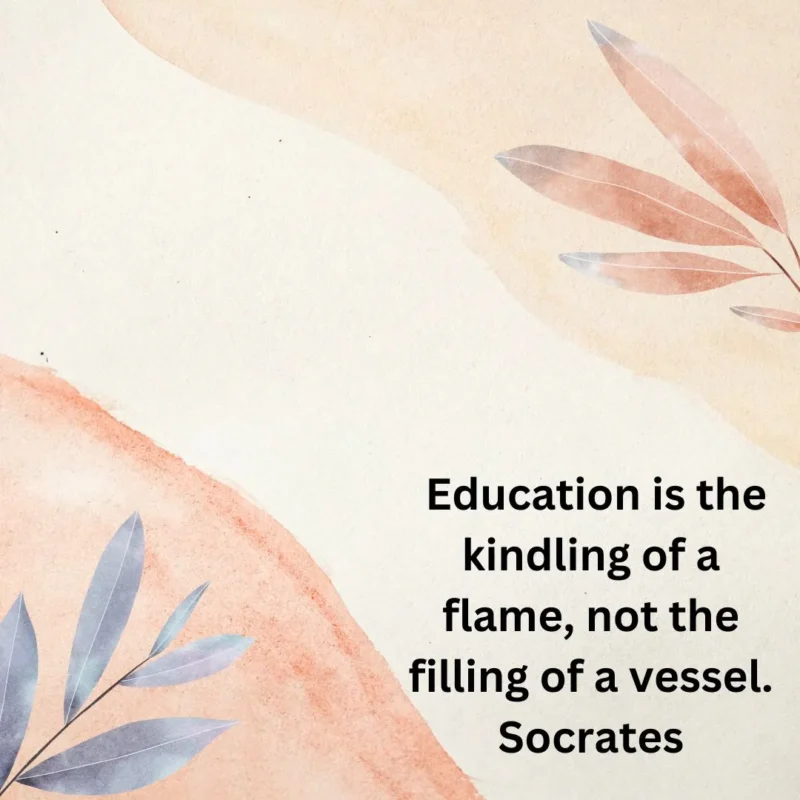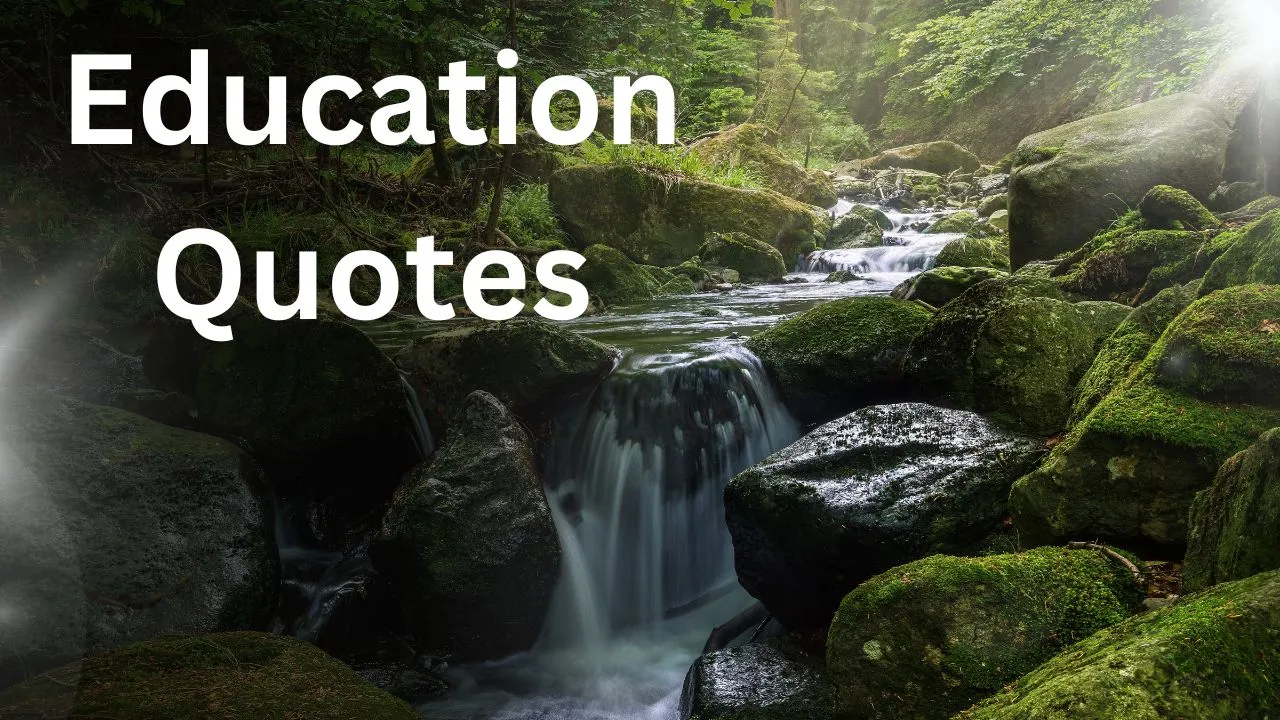Educational Quotes For Kids
| Education is the kindling of a flame, not the filling of a vessel | Socrates |

Rethinking Education: The Socratic Approach
The NET Model in Commons The profound statement from Socrates, “Education is the kindling of a flame, not the filling of a vessel,” shines light on the essence of learning and sheds constructive doubt on shared beliefs about how education should be. Socrates could be saying that education should not be deemed as when you fill an empty container with knowledge literally— this is the mechanism of thought being instituted. He instead argues that this should ignite curiosity, creativity, and critical thinking within (i.e., the individual). The vision of striking a spark is that education should excite and fuel students — but never leave them because they are always in the process of learning. Ponce highlights how an education centered on igniting intellectual curiosity is a living, breathing system based around the development of holistic Intellect—the ability to dare inquiry, question assumptions and entertain new ideas.
The statutory and curricular implications of Socrates’ statement are vast, ranging from student-centered learning to inquiry-based education to intellectual autonomy.
Top 3 Education Quotes
Top 15 Love Quotes
Igniting Curiosity: The True Purpose of Learning
In this model, teachers become guides or coaches, not just transmitters of information. They aim to facilitate an environment that promotes participation, dialogue, and debate, enabling students to uncover the conceptual landscape for themselves. Through igniting the spark of interest, education is a self-reinforcing cycle that keeps students driven to learn and ascertain knowledge till eternity. Additionally, this approach embraces concept-driven learning — viewing knowledge as a living and ever-incomplete system rather than tiresome static facts (to be memorized only to be quickly forgotten) that demand students adapt, interrogate, and refine their understanding through time. Socrates’ wisdom, in the end, urges us to remember that education does not serve its proper ends if it simply delivers facts; it intends to create a free and just human being who can think for themselves and contribute to society. Through this philosophy, we can reinvent education as a force for liberation, unlocking humankind’s potential, creativity, and innovation that leads toward self-development, social progress, and community well-being.
| Being a student is easy. Learning requires actual work | William Crawford |
Beyond Attendance: The Distinction Between Being a Student and True Learning
- Herbert Shurman once quoted William Crawford. The original sentence was, “It is quite sad…”), The whole business of “learning is work,” a distinction that drives a natural wedge between taking on the role of student and authentically engaging in learning. As a student, you could show up to your classes, get through the satisfactory completion of your assignments, and turn in enough work to get by. On the surface, it may feel you are not worrying about anything but merely taking a course instead of another, and that (perceived) shallowness can create an illusion that one is learning simply because one took some course or program. But Crawford’s quote underscores that natural, lasting learning — promoting intellectual development, critical thinking, and true understanding — requires engagement; it depends on effort. Education demands that students move beyond the reassuring embrace of familiarity to test their assumptions and face fierce ideas.
5 Quotes About trust For Instagram
The Illusion of Learning: Why Engagement Matters
- Crawford highlights the intellectual ennui, struggle, and resilience required to learn. Authentic learning struggles with complex concepts, peering into the heart of great questions and searching for meaning between distant realms. It allows students to take responsibility for their learning- to discover, reflect upon, and utilize all they are learning. This change of mindset, from “student” to “learner,” allows individuals to transition from mere recipients of information to engagers in constructing their own knowledge. Understanding that learning is hard work helps to create an environment of growth and a love for learning in our students, thus enabling them to reach their full potential. Educators and policymakers can also use this insight to re-design educational tools that focus on depth rather than breadth and enhance Active learning while providing safety nets for students to become self-directed learners. In the end, Crawford’s quote serves as a reminder that learning is fluid and lifelong and takes dedication, perseverance, and effort— with results that translate far beyond what is done in an academic setting. In this world, the mindset must be adapted toward a culture of real learning, of empowered and curious learners.
| Education is not the filling of a pot but the lighting of a fire | W.B. Yeats |
Yeats’ Timeless Wisdom: Redefining Education’s Purpose
- The Wise William Butler Yeats once said, “Education is not the filling of a pot but the lighting of a fire,” Boy, wasn’t he so right. In a passage from Yeats used metaphorically in the National Curriculum. Which current exam success should be demoted to the mere assertion, we contest this cliché view of education: ‘Education is not the filling of a pail but the lighting of a fire.” He would also say that real education lights a fire, awakens curiosity and creativity, and creates a lifelong desire to learn. What a beautiful expression of the type of learning happening in our classrooms, where students can roam through the bush and choose their paths with the burn of discovery. By igniting the inner fire, education becomes a self-perpetuating process of growth, learning, and service to society.
Beyond Exam Success: The Power of Igniting Curiosity
But like all great ideas, this nugget from Yeats is multi-dimensional and has implications far beyond the mere acquisition of one subject taught in school. We need to highlight sources of inspiration, motivation, and student-centered approaches, where educators are facilitators or guides rather than just a source of knowledge. This mindset realizes that we are all different because of our experiences, likes and dislikes, learning strengths, etc., so education should be tailored as such. Taking the power of curiosity, educators can establish foundational skills in critical thinking, creativity, and problem-solving that will empower students to adapt to a constantly changing world. Furthermore, the Yeats quote epitomizes the role of feeling, making, and thinking in learning and articulates the importance of multiple disciplines: embodied forms, creative media, and authentic tasks. Yeats’ poetic understanding of the matter, however, is that education at its best does not just help in informing but rather forming — educating and transforming people into sober-eyed citizens eager to contribute light in our world.
Please let me know if you need me to change or elaborate on anything,
I can give this paragraph 5 potential titles.

